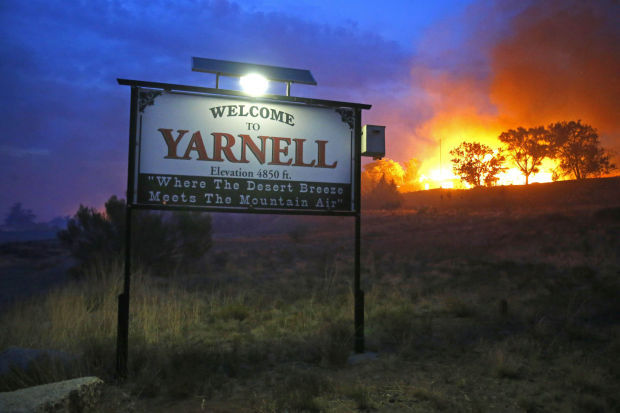PHOENIX т Comparing the stateтs firefighting actions to тKeystone Cops,т the attorney for Yarnell residents who lost their homes in a 2013 blaze wants the Court of Appeals to let them sue the state.
At a hearing earlier this week, David Abney acknowledged it may be an open question of whether the Forestry Division, which was initially battling the fire on state land, had an obligation to protect the residents of the community.
But Abney said the agency, which was coordinating various local, state and federal efforts, voluntarily took on that duty. And having done that, he told the judges, it had an obligation to do it right.
Abneyтs arguments have so far failed to get his clients their day in court.
Last year, Maricopa County Superior Court Judge Richard Gama threw out their lawsuits. He concluded that the state, in fighting the fire on public lands, had no duty to specifically protect Yarnell residents and their property.
People are also reading…
On Wednesday, attorney Brock Heathcotte, who represents the state, asked the appellate judges to uphold Gamaтs ruling. He said the state cannot protect everyone who chooses to live adjacent to the state-owned wilderness.
тBut the risk can be spread to the people who choose to live in the urban-wilderness interface,т he said.
тThey have the ability to form fire districts to protect their homes,т Heathcotte told the judges. тThey have the ability to insure their homes. They certainly have the ability to fireproof their homes.т
Abney did not dispute any of that.
тIf the state had not been there, then the people of Yarnell would have taken extensive measures to protect themselves,т he said, describing things like removal of rubbish, soaking the ground with water and removing portable propane tanks тwhich exploded and spread the fire.т
But he said the residents were entitled to rely on the stateтs assurance it would fight the fire and protect Yarnell and that it would do it competently.
тIf they had known that the state, all this flurry of activity by the state, was simply just nonsense, Keystone Cops instead of actual acts to protect them, they would have cleared out of there and, Iтm sure, some of them would have stayed and fought to the end to protect their property,т he told the judges.
What the appellate judges finally rule will have implications beyond the affected Yarnell homeowners.
It will set precedent for the stateтs legal obligations т and liability т in future cases where it is fighting blazes. And it could spill over into other disasters like floods.
The fire that started with a lightning strike destroyed more than 120 homes and resulted in the deaths of 19 firefighters.
Abney said thereтs plenty of evidence that the Forestry Division botched the job т evidence he will get to present to a jury only if Gamaтs decision is overturned.
Under questioning from Judge Peter Swann, Abney conceded that the state is not required to have unlimited resources to be able to protect all people, all property and the wildlands from all risk. But he said there is an obligation to manage the existing resources in a way that is not negligent, тwhich is what the state completely failed to do here.т
тQuite frankly, itтs a miracle that no civilians were killed in all of this, with the late evacuation and the fire moving as fast as it was toward the end, all of which we allege was predictable,т Abney said.
тEvery day they had the same wind and weather pattern,т blowing away from Yarnell in the morning and toward the community in the afternoon, he said.
тYou could set a clock by it,т Abney said. тSo why the state didnтt take advantage of the weather conditions and do some burn-outs in the morning and protect the community and its people and its structures is just beyond belief.т
This litigation is separate from lawsuits filed by families of the Granite Mountain Hotshots who died in the blaze, which were settled last year for $50,000 for each of the 12 families who sued. The original claim was for $220 million.











